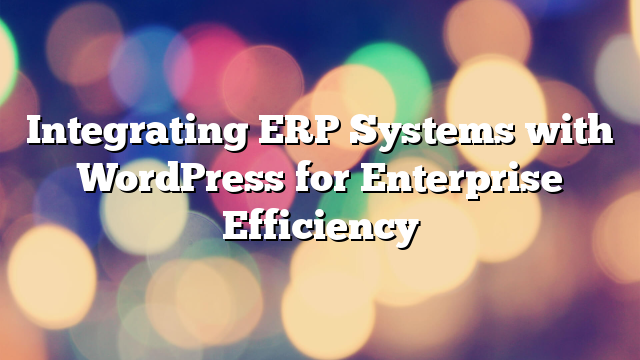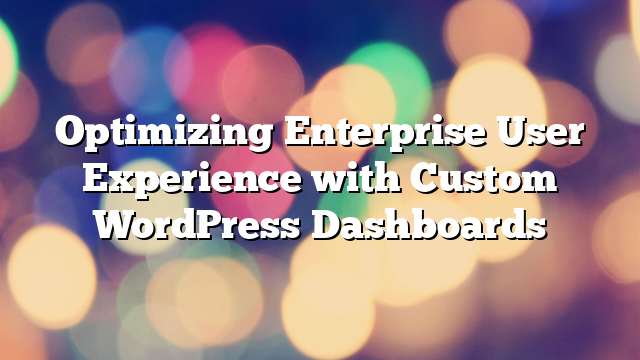The Role of PHP in WordPress Development for Enterprise Applications
09.10.2024

PHP plays a foundational role in WordPress development, serving as the backbone of the platform’s functionality. As enterprises continue to adopt WordPress for its scalability and flexibility, understanding how PHP contributes to the overall development ecosystem is critical. In this article, we’ll explore how PHP empowers WordPress to meet the needs of large-scale, enterprise-level applications.
Why PHP is the Core of WordPress
WordPress is built on PHP, making it an essential part of every interaction with the platform. PHP is responsible for the dynamic capabilities of WordPress, from content management to plugin development. Here’s why PHP is crucial for enterprise WordPress development:
- Server-Side Processing: PHP enables WordPress to process data on the server-side, ensuring that complex functionalities such as user authentication, database interactions, and content generation are handled efficiently.
- Open-Source Flexibility: As an open-source language, PHP gives developers full control over how WordPress functions, enabling custom solutions for enterprise requirements.
- Seamless Integration: PHP integrates easily with other technologies commonly used in enterprise environments, such as MySQL databases, APIs, and external services.
Customizing WordPress with PHP
One of the most powerful aspects of PHP in WordPress is its ability to be customized. Enterprises often have unique requirements for their websites, and PHP allows developers to create custom themes, plugins, and functionalities tailored to these needs.
1. Custom Themes
PHP is used to create dynamic themes that can adapt to different types of content. With PHP, developers can build custom templates, add conditional logic, and personalize user experiences, making it ideal for enterprise websites that require unique layouts and functionalities.
2. Plugin Development
For enterprises looking to extend WordPress’s core capabilities, custom plugin development is key. PHP powers the creation of plugins that integrate with third-party services, automate workflows, and add advanced features specific to enterprise operations.
PHP for Performance Optimization
Enterprise-level websites need to be optimized for performance, particularly as they scale. PHP offers several ways to improve the speed and responsiveness of WordPress websites:
- Code Optimization: PHP code can be optimized to ensure minimal server load and faster processing times, which is critical for high-traffic websites.
- Caching Mechanisms: PHP supports caching solutions like Memcached and OPcache, which store frequently accessed data and reduce the load on the database.
- Lazy Loading: PHP enables the implementation of lazy loading techniques, which only load content when it’s needed, improving page load times and user experience.
Security Considerations with PHP in WordPress
Enterprises handling sensitive data must prioritize security in their WordPress applications. PHP plays a central role in implementing security best practices, including:
- Data Sanitization: PHP functions help sanitize user inputs and prevent SQL injection attacks, a common vulnerability in web applications.
- Authentication and Authorization: PHP-based security mechanisms ensure that only authorized users can access certain areas of the website, providing an additional layer of protection.
- Encryption: PHP supports encryption of sensitive data, helping enterprises protect customer information, financial transactions, and internal communications.
Scalability Through PHP in Enterprise WordPress
As enterprises grow, their websites must scale to accommodate increasing traffic and content. PHP is well-suited for this task, allowing WordPress to handle large-scale applications through:
- Efficient Database Management: PHP works seamlessly with MySQL and other relational databases to manage large amounts of data efficiently, ensuring that enterprise websites perform well even with massive datasets.
- Load Balancing: PHP supports load balancing techniques that distribute traffic across multiple servers, ensuring that the site remains responsive during traffic surges.
- Asynchronous Processing: PHP can be paired with tools like Gearman to process tasks asynchronously, allowing background processes to run without affecting user experience.
Conclusion
PHP continues to be a critical technology for enterprise-level WordPress development. Its flexibility, scalability, and security capabilities make it the perfect choice for enterprises looking to build complex, high-performance websites. By leveraging PHP’s full potential, developers can ensure that WordPress meets the evolving needs of large-scale businesses.
To learn more about how PHP can enhance your enterprise WordPress application, visit AllWebDev’s contact page.



